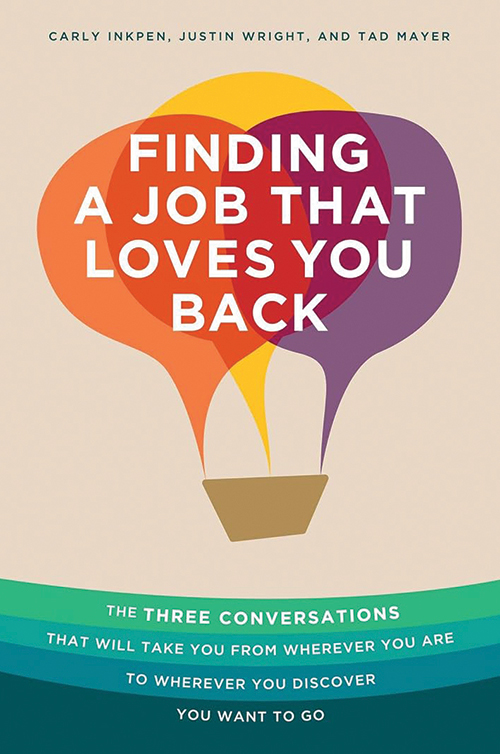
Finding a Job That Loves You Back: The Three Conversations That Will Take You from Wherever You Are to Wherever You Discover You Want to Go
Reviewed by Steve Jenkins
November 1, 2023
By Carly Inkpen, Justin Wright, and Tad Mayer. Habitus Incorporated, 2022. 280 pages. $17.97/paperback; $12.99/eBook.
Where are you in your career? Early, middle, or late stage? Or maybe you’re retired? This book offers a well-structured approach to uncovering your interests, building a network, and gaining access to work or volunteer opportunities that match your values. This is not a spiritual book; however, the approach offered sits well with the Quaker spirit: personal reflection, open-minded listening, relationship building, and honest dialogue.
The authors, all coming from backgrounds in mediation, offer a four-phased approach: (1) Finding Clarity, (2) Increasing Access, (3) Getting Work You Love, and (4) Building Greater Fulfillment. The best parts of the book, however, are the example questions and dialogues. In my experience, I stumble when trying to implement something that looks so good on paper; with the example questions and dialogues, you will be off and running in no time.
The first section helps you find clarity on your interests through self-reflection. As mediators, the authors tap into their negotiating expertise to help you distinguish between positions and interests. (Justin Wright is the chief executive officer of Habitus Incorporated, the consulting company that published the book.) As an example, the authors say most people focus on types of jobs—engineer, school teacher, or nurse (positions)—instead of the underlying reasons why they think a particular job may be enjoyable: solving problems, mentoring children, or healing people (interests). Through reframing exercises, you uncover interests met by the outcomes or processes that different jobs offer, then weave these interests together into a personal story. Finally, phase 1 offers suggestions on testing your story through conversations and modest investments of your time such as job shadowing or organization membership.
According to the authors, phase 2 is often an overlooked but extremely important part of your job search: talking with “connectors.” Connectors are not the decision makers who will give you a job; they are anyone who can provide what the authors call “access capital,” which includes relationships, skills, reputation, credentials, or a deeper understanding of your field of choice. Through information interviews, connectors are people with whom you can test your story; ask questions; gain skill-building opportunities; and, most importantly, get references to other potential connectors as you build your network.
Phase 3 is what we normally think of as the job search, including the interview and communicating with “decision makers” who will give you access to your ideal job. The authors take a unique approach, however, suggesting you look at the interview as a way to mutually evaluate job fit: not only how the prospective employer views your fit with the job but also how the company fits your values and interests. They discuss how to deliver a “yesable” proposal where you articulate how you perceive a company’s interests and how the job will mutually meet one another’s interests. Then they give helpful examples of how to approach the interview discussion and negotiate the job offer.
Finally, phase 4 is a re-visioning stage where you take the job you love to the next level. Over time and with experience in your field of choice, your interests may change, and you may be asking what fulfillment means to you. You may find yourself wanting to have a bigger impact in your industry or on society. People in this stage may be looking at starting a business or nonprofit, or possibly collaborating with others in their network to solve larger problems or serve a broader group. This section uses the skills from the previous phases in combination with your experience and network to pursue something bigger than yourself.
I tell people whom I mentor that their career success can be broken down into thirds: what they know, who they know, and how they respond to possibilities in random events. In a way, this book embraces that outlook: knowing yourself and your interests; building a network of connectors and decision makers; and staying flexible as your career, experiences, and interests evolve over time. No matter where you are in your life, this book will help you find a job or volunteer position and, even possibly, help you launch your biggest dream in a way that sits well with your spirit.
Steve Jenkins is an energy industry professional with interests in languages, cultures, and economic development. He is a member of Live Oak Meeting in Houston, Tex.



Comments on Friendsjournal.org may be used in the Forum of the print magazine and may be edited for length and clarity.